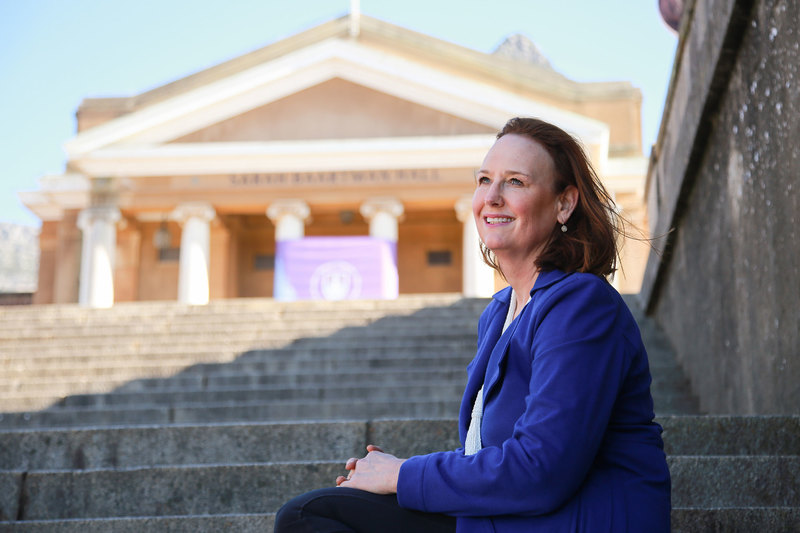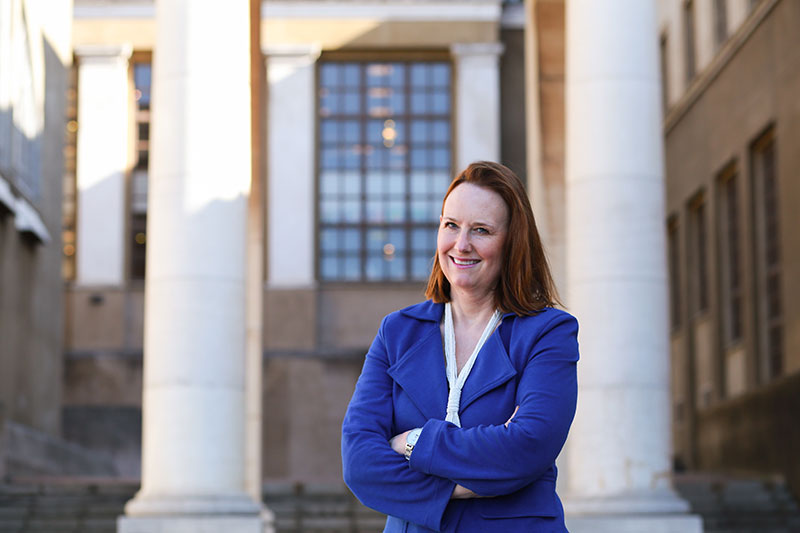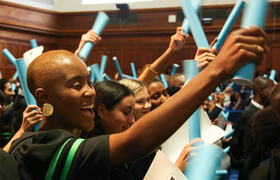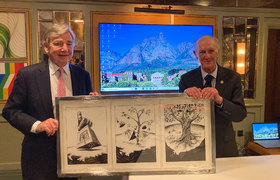Bring alumni back and broaden the culture of philanthropy
13 December 2022 | Story Helen Swingler. Photos Je’nine May. Read time 10 min.
Sarah Archer has put numerous balls in the air in her first 150 days as executive director of the University of Cape Town’s (UCT) Development and Alumni Department (DAD). The uptick in philanthropy, coupled with both a sustained traditional interest in education and changing values among a new generation of donors, has created a persuasive argument for investing in Africa – and in its top university. Now it’s time to put meat on bones, Archer said.
Archer has also invited alumni and friends of UCT to knock on her door in the next 150 days to tell her what they need from UCT.
The UCT alumnus brings a 15-year track record in development and fundraising to the role, including a five-year stint (2011–2016) at UCT as senior manager of international fundraising.
“My blood has always been UCT blue,” said Archer of her commitment to her alma mater.
She has lost no time implementing an ambitious strategy for DAD: a fundraising framework to unleash potential. This supports UCT’s Vision 2030, new trends in giving and enlarging Africa on the donor map.
Archer’s Vision 2030 for DAD capitalises on UCT’s strong selling points: its world-class academics, a diverse student cohort that represents the country’s brightest and best; multiple African and international networks, connections, and recognition that UCT is a gateway to Africa and the world.
“We are challenging donors in the Global North to put more money into higher education institutions in the Global South.”
“It’s a persuasive argument why they should consider giving that next cheque to Africa’s top university instead of Stanford or Oxford. In Africa, the donors’ pound or dollar goes further in terms of creativity, talent, and development.
“We are challenging donors in the Global North to put more money into higher education institutions in the Global South – UCT in particular.”
Investing in education
Much has changed since Archer last worked for UCT, both at the university (“So much new green and modern infrastructure to offset the traditional ivy-covered buildings”) and in philanthropic circles. Although the academic “rock stars” remain plentiful, the student profile has changed, and so too the circle of people interested in the university, its welfare and future.
The reality is that one in two UCT students needs financial or other support, Archer said.
“A growing number of our students are first-generation university students, who lack social networks that can help advance their careers. Alumni are often best placed to help. We have had wonderful interest from alumni volunteers, but we need even more professional mentors going forward.”
According to the World Bank’s Education Watch 2021 report, two-thirds of low- and lower-middle-income countries cut their education budgets after COVID-19 set in.
“Fundraising in a post-COVID-19 pandemic world is not for the faint-hearted,” said Archer.
It requires resilience, clarity of vision and a canny view of the changing funding dynamics in Africa and abroad.
“Some tried and tested principles that characterise fundraising in more mature markets don’t work in Africa. We must also work doubly hard to dispel the assumptions that giving to African institutions is loaded with governance and other risks,” she added.
Givers and shakers
The upside is that philanthropy is on the rise again. Archer believes that despite tough fiscal conditions, there is plenty of opportunity in the development world.
Donors are seeing the transformative power of education as graduates enter the job market, boost the economy, and contribute to development by breaking the cycle of poverty and inequality, which remain South Africa’s biggest challenges.
The character of giving is also changing rapidly, said Archer. To date, the three main funding streams have come from the Global North: western aid and development agencies, private foundations, and the very wealthy. But as Africa’s young population comes of age and the middle class emerges, a new opportunity arises for causes, including universities, not viable a few years ago.

Here Archer has drawn lessons from economist CK Prahalad’s ground-breaking book The Fortune at the Bottom of the Pyramid: Eradicating poverty through profits. Prahalad argues that economic prosperity and wealth creation can be stimulated from the bottom up – “trickle-up economics”.
“Prahalad calls for respect for those at the bottom of the pyramid as they are problem solvers to some of the biggest issues that afflict developing societies,” said Archer. “Africa’s great universities can take a lesson from this. By broadening the emphasis from fundraising among the very wealthy, perhaps our efforts will be rewarded by the fortune that sits at the bottom of the philanthropic pyramid.”
This sentiment is echoed by UCT President of Convocation Carl Manlan, who argued that African diaspora giving represents untapped potential. In some regions, this accounts for a significant portion of a country’s gross domestic product and should not be overlooked in the story of philanthropic giving that support growth on the continent.
Philanthropy’s changing face
Building a culture of philanthropy in students and staff is part of Archer’s vision. This includes teaching our current students about their role as future alumni.
“We need to inculcate a philanthropic mindset from day one in a student’s life so that current and next generation talent is supported. Increasing numbers of students receiving bursary support means increasing numbers of future alumni who understand first-hand the importance of helping students to get through university and into the world of work. Students in better resourced circumstances are keen to help their financially needy counterparts. We need to make giving to others easy, to harness this interest in peer-to-peer fundraising.”
Archer is also looking to tap into a younger set of donors: Millennials, Gen Z and the next generation.
“They believe in causes rather than institutions and in the power of activism and values.”
The younger generation’s giving profiles are different from their predecessors, she said. It’s important to understand what drives Millennial giving patterns.
“They are interested in philanthropic financing and are more risk tolerant. They believe in causes rather than institutions and in the power of activism, values and supporting others. Diversity, equity and inclusion are important to them.”
Allied to this is building a much-needed, young black African cohort of fundraisers. It’s an area that is close to her heart and part of her staff development plan.
“There’s a dearth of these skills in Africa,” said Archer.
Here she has established an internship programme for UCT graduates, to “grow our own timber, not only for UCT but for the sector”.
“One of my key jobs as head of this department is to ensure that we’re creating opportunities for our current staff to grow, develop and advance. Every trip I make I take along one staff member to ensure that we’re capacity building at the same time.”
Archer is keen to create a collaboration with local and other African university advancement offices and role players to establish a national graduate internship programme and leverage the link between African research funders and philanthropy.
Alumni and friends
The second part of Archer’s portfolio concerns a valuable and changing stakeholder group: UCT’s alumni, spread across the globe, are UCT’s best ambassadors. The team is hard at work to update and build the alumni database and networks and to develop opportunities to bring them back to campus with their friends.
“We want to build a sense of belonging for alumni around the world, working to ensure that they feel a strong connection to their alma mater. For this to happen, we need to work more collaboratively with UCT brand custodians as well as student-facing units across our institution. And students need to have had a positive experience at UCT.”
UCT has many friends in the wider city community. The 2021 fire on upper campus showed how much public goodwill there is for the university, said Archer.
“The fire was a tragedy, but it galvanised so much support – not just from donors, our alumni and students, but from our Cape Town and further afield communities.
“We’ve already founds thousands more alumni around the world who were previously not on the database and we’re designing more customised alumni engagement projects and looking at events that will bring different cohorts of former students back to the university. Our alumni are our champions all over the world and we want to ensure [they] are up to date on all the good news stories for UCT, which the more challenging ones can easily drown out.”
“We have plans for an alumni and friends centre to make UCT a real home for alumni.”
Archer hopes to expand UCT’s international network of alumni chapters (in Europe, the United Kingdom, North America, Europe, Australia and New Zealand), drawing alumni closer to their alma mater while building a culture of giving and philanthropy.
“We have plans for an alumni and friends centre to make UCT a real home for alumni, said Archer. “We want alumni to still feel that they belong at UCT. When they visit family or come back to Cape Town, there’s a door they can knock on to say hello.”
 This work is licensed under a Creative Commons Attribution-NoDerivatives 4.0 International License.
This work is licensed under a Creative Commons Attribution-NoDerivatives 4.0 International License.
Please view the republishing articles page for more information.










